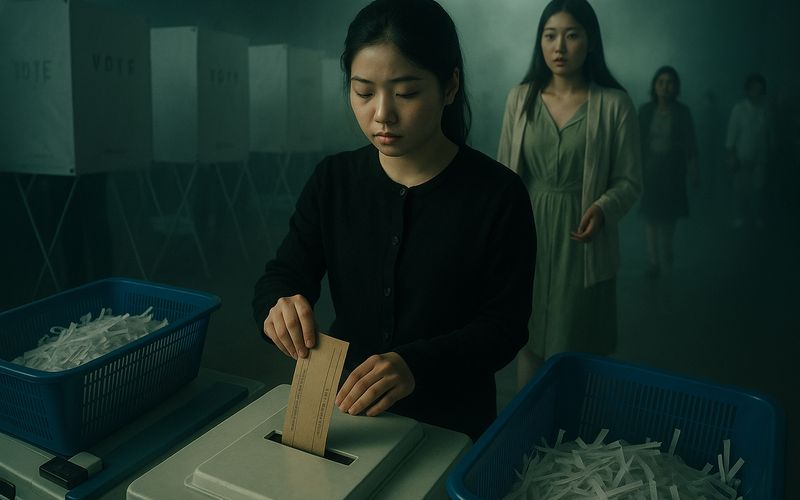Over 15 million South Koreans cast their ballots as of Friday during early voting session in anticipation of the June 3 special presidential election to replace ousted former President Yoon Suk-yeol.
Early voting in the election began on Thursday morning and culminated at 6 p.m. local time on Friday, according to the South Korean Yonhap News Agency. The turnout on Thursday broke records, but Friday’s early voting total came in slightly below the record-high in 2022, when Yoon defeated the leftist frontrunner in the current election, Lee Jae-myung of the Democratic Party. Nearly 35 percent of eligible voters went to the polls during the early voting session.
Both major South Korean parties, the Democrats and the conservative People Power Party (PPP), have actively promoted early voting. South Korean celebrities have also flooded social media with selfies showing that they voted, though they are traditionally expected to keep their support to themselves.
“Celebrities made cautious efforts to adhere to the ‘no color, no gesture’ rule — an unspoken but strict mandate that Korean celebrities not display political stances during election season,” the Korea JoongAng Daily reported on Friday. One celebrity, singer Lee Chae-yeon, brought a packet of cherry tomatoes to vote because she also sported a blue bracelet to ensure the colors of both political parties were represented.
South Korea is experiencing a season of extraordinary turmoil that has left it without a functional executive branch since early December, when Yoon abruptly attempted to impose martial law on the country in response to the Democrats in the National Assembly obstructing conservative bills. Yoon accused the South Korean left of coordinating with communists in North Korea and claimed that legislative debates were a national security threat.
Military rule lasted only about six hours as National Assembly lawmakers crawled through windows and elbowed past flanks of heavily armed soldiers to return to the legislative chambers and vote against the martial law decree. Yoon apologized shortly after the failure of his martial law, but was rapidly impeached and is currently facing trial on charges of insurrection and abuse of power.
The Democratic Party fueled further chaos after Yoon was temporarily removed from office by immediately impeaching the ruling People Power Party (PPP) interim president, Han Duck-soo, and blocking the PPP from nearly every governing activity through the special election. Han’s impeachment led to Finance Minister Choi Sang-mok temporarily taking over the presidency, then Han returning to power after the nation’s constitutional court overturned his impeachment. Han vacated the position in anticipation of the special election, which should have led to Choi assuming the position again, but Choi refused, making Education Minister Lee Ju-ho in May.
Lee Ju-ho is currently the interim president of the country, its fourth in five months.
The PPP is running former labor minister Kim Moon-soo as its presidential candidate, who is campaigning on a platform of fixing South Korea’s increasingly fragile economy and attacking the unpopular Lee for his own legal woes.
“To restore the economy, we must stop Lee Jae-myung,” Yonhap quoted Kim as saying at one of his final campaign appearances. “If we fail to stop him now, our economy could collapse in a way that we won’t be able to recover even in five or 20 years.”
“Lee Jae-myung is currently facing five court cases and has been involved in tragedies with many people around him dying,” Kim said at a separate campaign event last week.
Lee Jae-myung is campaigning in the midst of multiple criminal investigations. He is under investigation for allegedly making false statements related to a real estate corruption scandal and falsifying information related to election organization. In November, the Seoul Central District Court sentenced Lee to a year in prison, suspended for two years, for lying about his relationship with a late businessman who died mysteriously while being investigated in another, related corruption scandal. Lee was officially found guilty of violating election law by claiming he did not known the individual in question while serving as mayor of Seongnam from 2010 to 2018.
The election law case made it to the Supreme Court, which ruled in early May undoing the overturning of his initial guilty sentence and leaving open the possibility that he could be barred from running for office. The case has yet to be resolved, allowing Lee to continue campaigning.
Lee has largely avoided his legal woes on the campaign trail except to accuse the former Yoon administration of targeting him for political reasons. He has instead emphasized Yoon’s martial law fiasco, accusing the former president of “insurrection” and calling for sprawling criminal investigations into senior PPP members to hold all involved in the failed martial law decree “accountable.”
The final polls before the government-mandated period of silence in anticipation of the election found Lee holding a narrowing, though formidable, lead against Kim. The anti-Democratic Party vote appears to be split between the PPP’s Kim and Lee Jun-seok of the third-party New Reform Party (NRP). Polls reportedly found 49 percent of voters supporting Lee Jae-myung, 35 percent supporting Kim, and 11 percent supporting Lee Sun-seok — meaning the absence of Lee Jun-seok in the race would not guarantee a win for the PPP.
Follow Frances Martel on Facebook and Twitter.













